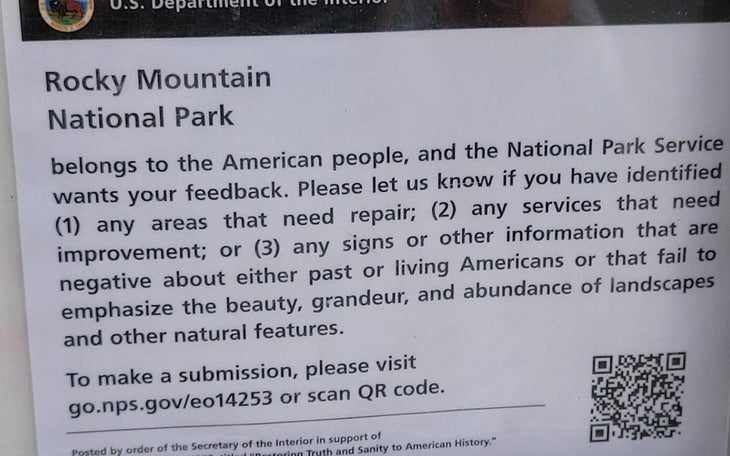New messaging posted at U.S. national parks and historic sites is requesting that park visitors report “any signs or other information that are negative about either past or living Americans.”
The Colorado Sun, signs with the directive were posted on Friday, June 13, at the in eastern Colorado. Amache was one of ten incarceration sites for Japanese Americans during World War II.
An identical sign was posted at the nearby Sand Creek Massacre National Historic Site in Colorado. In 1864, the U.S. Army slaughtered approximately 750 Southern Cheyenne and Arapaho indigenous people on the grounds.

In a , Rachel Pawlitz, a spokesperson for the NPS, said the order “reaffirms the NPS mission by emphasizing the importance of accuracy in how we tell stories of American history.”
But the request has sparked concern that the federal government is attempting to whitewash its own history.
Theresa Pierno, president and CEO of the National Parks Conservation Association, called the order an attempt to rewrite American history.
“Rangers should be able to talk about the history of Japanese American incarceration at Amache, or the history of slavery at Fort Monroe, without looking over their shoulders in fear,” Pierno . “If our country erases the darker chapters of our history, we will never learn from our mistakes. These signs must come down immediately.”
In addition to reporting any negative depictions of Americans, the signs also request that visitors file a report if they see any information that does not “emphasize the beauty, grandeur, and abundance of landscapes and other natural features,” and notify the Park Service of any “areas that need repair” or “services that need improvement.” Each sign includes a URL and scannable QR code, which leads to a webpage.
The signage comes on the heels of an executive order, “Restoring Truth and Sanity to American History,” issued by President Donald Trump in late March, which was implemented by Doug Burgum, U.S. Secretary of the Interior (DOI) on May 20.
Trump’s order decried “a concerted and widespread effort to rewrite our Nation’s history, replacing objective facts with a distorted narrative driven by ideology rather than truth” and said this effort has seen to it that “our Nation’s unparalleled legacy of advancing liberty, individual rights, and human happiness is reconstructed as inherently racist, sexist, oppressive, or otherwise irredeemably flawed.”
When it was issued on March 27, the “” order made national news because it aggressively targeted the Smithsonian Institution, requiring that the museum “remove improper ideology.” of the order’s implementation in the DOI also requires the posting of the signs seen at Amache and Sand Creek last week.
Burgum ordered the leaders of the National Park Service, Fish and Wildlife Service, Bureau of Land Management, Bureau of Indian Affairs, and Bureau of Reclamation to post such signage “throughout each property, in as many locations within each property as necessary and appropriate to ensure public awareness.”
The order also requires that within 120 days, every department remove any information that “inappropriately disparages Americans past or living.”
The implementation of this order obviously will hinge on each park manager’s interpretation of the word “inappropriately.”
John Hopper, founder of the Amache Preservation Society, runs a museum dedicated to the internment camp in the town of Granada. “It’s simple,” he told the Sun. “You can’t sugarcoat history. You have to learn from it, right?”


